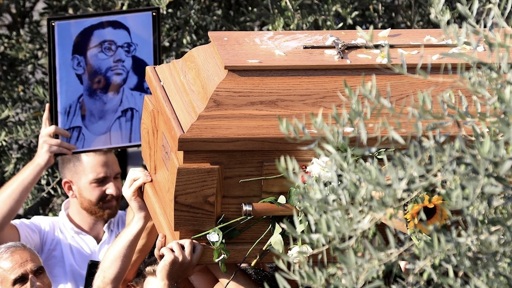Thousands took part in a solemn funeral procession for renowned composer and political satirist, Ziad Rahbani, in the Lebanese capital, Beirut, on Monday, July 28. The procession took place two days after he died at the age of 69, reportedly due a heart attack.
Crowds of mourners gathered outside Khoury Hospital east of Beirut, where Al-Rahbani passed away, before heading to the Church of Our Lady of the Dormition in the town of Bikfaya, in Mount Lebanon, to pay him their last respects.
Ziad’s prominence was not merely due to being the son of the Arab diva and renowned singer Fairuz, nor to his descent from the eminent Rahbani School of Art (known as the Rahbani Brothers). It was rather due to his unique works of art that combined the most noble ideas of revolution, resistance, patriotism, and love.
His satire also roused the conscience of ordinary Lebanese and Arab people alike, amidst political turmoil, social contradictions, and a century-long struggle against imperialism.
Ziad was a prolific artist and author, aside from being a broadcaster and a journalist writing for different Lebanese newspapers, including Al-Nidaa, An-Nahar, and Al-Akhbar.
The music prodigy
Ziad al-Rahbani, who was born in 1956, showed prodigious talent at a very young age. He began composing at 7 years old, published a collection of poetry by age 12, and wrote and performed his first play at age 18.
The “Oriental Jazz” pioneer
Although his early works were influenced by the Rahbani Brothers, which drew on Lebanese folk traditions, Ziad soon created his own unique form of music, which he called “Oriental Jazz”, by blending Lebanese folk music and classical Arab with jazz and other genres, including flamenco, tango, and funk.
The Lebanese civil war: a turning point in Ziad’s personal life, politics, and art
The complex and devastating Lebanese civil war, which spanned from 1975 to 1990, shaped Ziad’s political views, and had a great impact on his personal life and works of art.
After the Lebanese right-wing Christian militias besieged and massacred around 1,500 Palestinians in Tal el-Zaatar refugee camp in Beirut in 1976, Ziad, who was born and raised as a Greek Orthodox Christian, decided to relocate to Muslim-dominated West Beirut, leaving his family home in Christian-dominated East Beirut.
In an interview with veteran Tunisian-Lebanese journalist and activist Ghassan Ben Jeddo on Al Mayadeen’s TV channel in 2012, Ziad explained how the Tal el-Zaatar massacre contributed to his political awakening and motivated his pro-Palestinian stance.
The tragic events of the Lebanese civil war exposed the fascist approach of right-wing parties in Lebanon, pushing Ziad towards left-wing movements. It is believed that he initially engaged in political activities with the Popular Front for the Liberation of Palestine (PFLP) and its Lebanese sister party, the Arab Socialist Action Party-Lebanon, before ultimately joining the Lebanese Communist Party.
In the aftermath of the civil war, his plays and songs became focused on addressing Lebanon’s political and social complexities that resulted from the war, such as sectarianism, the struggle of the working class, and corruption.
The unbending voice of resistance and revolution
Ziad’s musical and theatrical masterpieces, alongside his political critique, have been a living embodiment of resistance and revolution against the imperialist-Zionist project in the West Asia Region.
“You will never build a country while Israel is at your doorstep, and you will never achieve justice and freedom when they constrain you between two choices; either your security or your dignity,” Ziad asserts in one of his most famous quotes.
“On Their Own”: Ziad’s immortal melody of resistance and revolution
The legendary Lebanese musician wrote and composed many songs that glorified resistance and revolution against the Israeli occupation. Yet, his masterpiece “On Their Own” (or Wahdon in Arabic) has been particularly ingrained in the consciousness of the Arab people.
The lyrics of the song were authored by prominent Lebanese poet Talal Haidar, and carolled mellifluously by the diva Fairuz. However, it became an immortal melody of resistance and revolution after being creatively composed by Ziad.
The song recounts the last journey of the three Arab resistance fighters Yaseen al-Houzani (from Iraq), Ahmad Mahmoud (from Syria) and Munir al-Mughrabi (from Palestine), as they crossed the border between Lebanon and occupied Palestine to carry out Operation Al-Khalisa in the illegal Israeli settlement of Kiryat Shmona in 1974.
Ziad’s tunes successfully fostered an affinity between the listeners and the three heroes, who were assassinated after killing 18 Israeli soldiers during the operation.
The rhapsody triggers a deep nostalgia within the audience, rekindling their hope that the extraordinary patriots will return from the operation alive. It also provokes a profound sentiment of reverence for their sacrifice.
Ziad will remain ineffaceable in the Arab collective memory
For many, Ziad’s legacy will remain ineffaceable in the collective memory of the Arab nation, not only because of his art or political ideas, but also because he chose to be a person who affiliated with ordinary people and dedicated his life to voice their concerns. The PFLP mourned Ziad in a statement issued on Saturday:
“Ziad Rahbani was more than an artist; he was a living national conscience and an intellectual engaged with the causes of his people, always siding with the poor and marginalized, and rejecting injustice, tyranny, and sectarianism. He was never neutral. Rather, he supported the poor, the people, Palestine, Gaza, and the revolutionaries, who asked for nothing but a homeland that is not for sale and a life without humiliation.”
The post Lebanon bids farewell to iconic musician, playwright, and revolutionary Ziad Rahbani appeared first on Peoples Dispatch.
From Peoples Dispatch via this RSS feed


